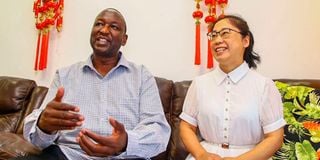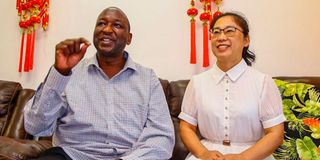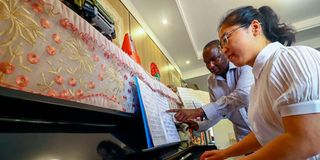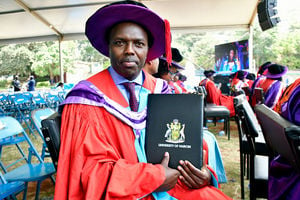
Dr Henry Kibet Rotich, Director of Metrology and Testing at the Kenya Bureau of Standards (left) and his wife Xu Jing, a lecturer at the Confucius Institute at the University of Nairobi during an interview at their home in Nairobi on November 16, 2024.
At the start, there was a Dr Henry Kibet Rotich, born in Kenya; and a Ms Xu Jing, born half a planet away in China.
Now they are Mr and Mrs Rotich, with a son and a daughter aged 14 and 12 respectively, and they live in Nairobi.
Jing is a lecturer at the Confucius Institute at the University of Nairobi, in the Department of Linguistics.
Henry, on the other hand, wears many hats. He is a director at the Kenya Bureau of Standards in charge of metrology and testing.
He is also the chairman of the Kenya-China Alumni Association and the chairman of the African Metrology Organisation. He is also the chairman of the Pan African Quality Infrastructure.
Theirs is a story of love transcending borders and language barriers.
We interview the couple as they gear up for celebrations to usher in the new year. In their Nairobi apartment, beautiful red lanterns hang on the wall. They have big, apple-like lines in the middle, symbolising happiness and love.
The couple tells Lifestyle that of the many things that the Chinese culture thrives in, good health, happiness, success, and wealth dominate the list. This is why, in every celebration like the New Year or Spring Festival for Chinese, they use such symbols and paint them red.
The story of the couple dates almost two decades ago when Henry saw a scholarship advertisement in a newspaper.
He went to the Ministry of Education, picked forms and made his application. Luckily, he was successful. With no knowledge about China, save for his grandmother’s kettle that had a “made in Shanghai” mark, the ambitious Henry took his flight to Changchun City in China.
“I went to China just because of that scholarship, I think if I was not reading newspapers, I would not have known about China,” Henry tells Nation.Africa.
Jing, on the other hand, was going on with her studies in her home country. Her only chance to interact with Mr Rotich – as she would later find out – was through a transfer to a high school away from her hometown.

Dr Henry Kibet Rotich, Director of Metrology and Testing at the Kenya Bureau of Standards (left) and his wife Xu Jing, a lecturer at the Confucius Institute at the University of Nairobi during an interview at their home in Nairobi on November 16, 2024.
Having studied Japanese as the only foreign language from primary to middle school, her father wanted her to study English as well.
“I feel that if I didn’t learn English, I would not have come to Kenya; because if I learnt only Japanese, I would have gone a different way. But I learnt English. That is why when we met, I could communicate with him (as a friend). I think from there, my life changed as I also changed my name,” Jing tells Lifestyle with a sparkle of light on her face.
Their paths first crossed at the Northeast Normal University in China. They were both on scholarship but at different levels of education. Jing was pursuing an undergraduate degree in education while Henry was doing his master’s degree in chemistry.
“I started to work hard because in the teachers’ college, if you work very hard you become a student leader and when your academic grades are good, they (lecturers) send you directly to the university. When I finally got to university, I cried because of the excitement,” she says, laughing.
Henry, on the other hand, grew up with his grandmother from when he was about five years old. He describes his grandmother as a very strict lady who, despite not having gone to school, liked education. That contributed to his academic excellence.
“One day, I found my grandmother looking at my book upside down. She would even beat me at some point and I thought she had seen something wrong in my book. But I realised that she just wanted to send a message that she cared about my education by monitoring what I was doing,” he says.
It is out of such love that even after his parents died, he found comfort from his grandmother — who died three years ago at the age of 114. Henry says that together with his eight siblings, they hold a memorial for her every December.
“My parents passed on much earlier than my grandma. It was very hard growing up without them, but since I was with my grandma, she comforted me,” he says.
After completing his Master’s degree, Henry secured another scholarship to pursue a PhD in hydrology and water resources at Jilin University, located in Chaoyang district in Changchun City, China.
Jing, on the other hand, enrolled for her Master’s in higher education after she graduated with a bachelor’s degree in education.
Henry says the eight years he spent studying for both Master’s and PhD helped him learn more about the Chinese culture. He fully immersed himself in it despite the initial communication barriers.
“I remember one time I was going to buy chicken and I didn’t know how to say it. So, I had to draw the head of the cock and they understood because I was in a place where they sell various types of food,” he says amid laughter, while appreciating how patient the Chinese were with him in a foreign country.
“We started learning phrases like ‘wǒ bù zhīdào (I don’t know)’. So, when we were asked anything, we used to say ‘wǒ bù zhīdào’,” He says of his journey and other foreign students to learning Chinese mandarin.
However, the “I don’t know” response was not relevant in all questions. He says that they felt embarrassed when they said that they didn’t even know their names when a lecturer asked them. This intrigued their seriousness about learning the Chinese language.
With a female scholar friend, who spoke English like him, Henry says he gradually built a rapport with Jing. For five years, their relationship continued to blossom, and from “wǒ bù zhīdào”, he learnt how to fluently speak Chinese sentences like “nǐ hǎo, wǒ ài nǐ (hello, I love you)”, among others. He soon won Jing’s heart.
After he graduated with a PhD, he asked for her hand in marriage. He says he loved how friendly and receptive her parents were.
That made it easy for him to go on with the marriage, which was confirmed after they had three marriage ceremonies according to Chinese and Kenyan traditions.

Dr Henry Kibet Rotich, Director of Metrology and Testing at the Kenya Bureau of Standards (left) and his wife Xu Jing, a lecturer at the Confucius Institute at the University of Nairobi during an interview at their home in Nairobi on November 16, 2024.
“In China, there is the civil marriage where you go to the government then you are given a certificate, which we did days earlier. We then had a Chinese wedding and a church wedding on the same day. I was attending church in China, so the priest agreed to conduct the marriage for us in church,” says Henry.
The distance from Changchun City to Jing’s home is more than a hundred kilometres. Henry, who did not want to be late on his big day, says he started his wedding-day journey at 3am. He wanted to ensure that everything happened as planned. Students from Kenya and other parts of Africa, whom he says became his extended family, formed part of his big celebration day.
When they came to Kenya, Henry says, they had another civil wedding and were issued with another certificate to formalise their marriage. This was also to allow his wife to be legally in Kenya since the Chinese do not allow dual citizenship. Though married to a Kenyan, Jing has retained her Chinese citizenship.
“I only have Chinese citizenship but Kenya is my permanent home. I can change my citizenship to Kenyan but if I do so, then it will be hard if I go back to China because I will be a foreigner there,” she says.
Henry says that at the time, there were very few Chinese restaurants in Nairobi, and that made it difficult to get some of the Chinese cuisines.
Unlike Kenyan dishes, Chinese foods are very spicy. They can be so hot that an unfamiliar tongue can become numb. His wife gradually learnt to love Kenyan delicacies, especially the seafood.
“We eat a lot of omena. They (university friends) told me when you eat omena, you become stronger and cleverer. That is similar to Chinese. In China, we say that if you eat a lot of fish, you become cleverer. So, we always eat a lot of fish,” she says.
Jing acquired the taste for omena from her university friends. This is how Henry also learnt how to eat Chinese foods. He says that adopting other people’s culture is highly influenced by the people one is interacting with.
“I had a friend from the southern part of China, and so a lot of the things that I got to appreciate is from what he was telling me. I remember he took me to eat pork. I had not eaten pork when I was in Kenya but when I went to China, I tried to eat it,” he shares.
For his family, whether in Nairobi or upcountry, Henry creates time to be in the kitchen and prepare ugali and simple Kenyan mixed vegetables.
“The three of us always fight for the ugali ‘crisps’. We always encourage my husband to make more ugali and let it burn so that we can get the brown ‘crisps’. Everyone always goes to the kitchen to watch him cook ugali,” says Jing.
Jing also notes that seeing tea plantations makes her feel at home. Culturally, the two countries are large tea consumers, although the process of preparing this drink is different.
“In Kenya, you include milk, but in China, we don’t. Only the tea leaves are placed in the water. In China, we use sugar for some soup or some food which we cook but we don’t use it on tea totally,” explains Jing.
As part of mutually embracing the two cultures, their two children have two surnames, which include the dad and the mother.
According to Chinese culture, parents give names depending on what they are wishing for their children. This is contrary to some Kenyan cultures where names are given based on time of birth.
“If you look at the Kalenjins, names are given based on the time of the day that we are born. In my case, ‘Kibet’ means I was born around noon,” says Henry.
“In the case of my name, Xu Jing, usually we start from the surname. So, my surname is Xu, and my given name is Jing. So, Jing has several different meanings like bright, shining like a diamond,” the wife says.
Henry also has a Chinese name, Heng Li. The two names together refer to being wealthy or successful. “Heng” is a translation of “Henry”. His wife says that calling her Mrs Rotich is what tickles her laughter.
“No matter where I say that I am Mrs Rotich, people laugh and hug me. They say now I am a Kenyan. At the University of Nairobi, sometimes a delegation comes from China, and I translate for them, then the vice chancellor says, ‘No, this lady is Mrs Rotich,’” she tells Lifestyle, laughing.
Despite embracing Kenyan delicacies, the couple says that their meals are mostly Chinese cuisine. They also speak Chinese most of the time when they are at home. This, they say, is to help their children not to forget their mother tongue. Chinese language is taught in a number of schools in Kenya. Some universities also teach the language.
“Even my Chinese friends wonder how my children can speak four languages, that is English, Chinese as their mother tongue, and even Kiswahili then French which is a foreign language,” says Jing.
With Kenya being a home of marathoners, Henry says that both their children are athletes who participate in different games at their school while at the same time representing their school at both national and international tournaments.
“Our son went to China, where we sent him for six months, and he participated in the competitions there. He was always number one. My daughter also likes running and she helps her class team to win,” says Henry.
Out of being a lecturer, Jing says, she has come to love how hardworking and committed Kenyans are — especially at learning foreign languages.
“The Kenyan environment is so good that even before your children go to school, they already know how to speak English or Kiswahili. That is why, when you go to school, you have time to learn another foreign language,” she says.
Apart from her appreciation of the inborn talent of Kenyan students to learn foreign languages, Jing also admires the hype in Kenyans that makes life more fun.
“Kenyans like singing and dancing to the musical beats no matter whether you are happy, busy or tired. So, Kenyans have this kind of happy attitude and learn new things like the Chinese language very fast,” she says.
Besides being a lecturer, Jing says a lot of her time goes into attending to her children and planning for their daily engagements.
Henry says that despite being a workaholic, he still sets aside 20 percent of his time to be with his children.
“I go to work on Monday to Friday and come back in the evening. In the morning, I drop our children at school, and she picks them up in the afternoon. Sometimes, I travel, so she is more or less 80 percent of the time with the children,” says Henry.
While Kenya celebrates New Year’s Day on January 1, the Chinese calendar is different. This makes them celebrate their New Year on a different date in January.
Henry’s family actively participates in Chinese cultural events like the New Year, the Independence Day and any other national functions.
“When we also have Kenyan functions we participate with them. In December (2023), we had the initiation of our firstborn and many other children in Karen. We invited some Chinese. We appreciate mutual cultures because that is our identity,” says Henry.









